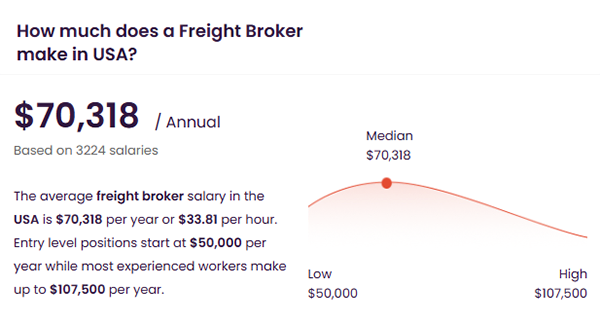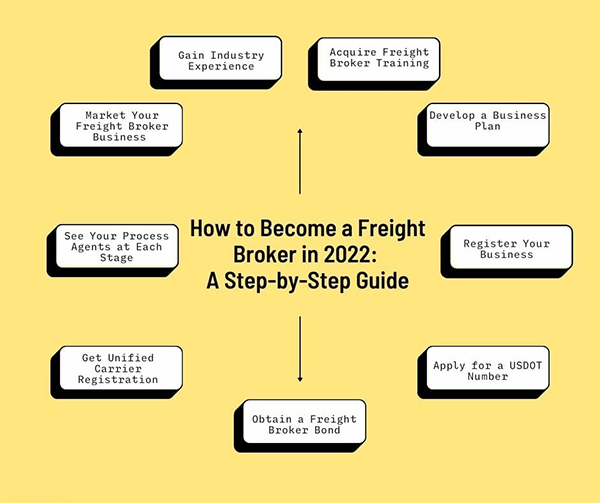Getting Started with Freight Broker Training and Becoming a Licensed Freight Broker
Freight broker is one of the most significant job roles that keeps a check on the supply chain. In the USA alone, more than 2000 million tons of trade is done each year (including imports and exports) (Bureau of Transportation Statistics).
Becoming a part of this massive industry can bring a whole chest of treasures filled with opportunities and career growth. Hence, consider this article as the sign that tells you to get a freight broker training and earn a license as soon as possible.
If you want to learn more, keep reading the article.
What is a Freight Broker?
A freight broker refers to a third-party intermediary through whom goods are passed onto the transporter or the carrier. Generally, their goal is to help shippers and carriers come together.
They are expected to organize the transportation of cargo efficiently and in accordance with the legal and regulatory statutes in effect. Other primary responsibilities of the position include:
- Rate negotiation,
- Contract capture, and
- Shipment completion with no issues arising.
Freight brokers play a noteworthy role in the entire chain of logistics, something that has become more vital with the rapid expansion of e-commerce and global trade.
Why Consider Being a Freight Broker in Georgia?
Georgia is among the fastest-growing logistic hubs in the country, hence an ideal place to establish a freight broker business. This is where the Port of Savannah is located, considered one of the busiest and most efficient in the world. Hence, it is also very instrumental in the facilitation of international trade, with a lot of freight to be handled by the broker.
Middle-of-the-center in the Southeast United States, Georgia is another name that makes major transportation corridors within the state accessible to a freight broker, including main highways and rail systems.
Freight brokering is one of the most promising and well-paying jobs one may have in Georgia as demands for freight services are increasing. Setting up this venture takes some decent training, knowledge, and licensing.

Why Freight Broker Training is Important
The freight broker training would be absolutely necessary for those who want to start practicing in the field. As much as one may learn from the job itself, the training programs get you on your feet far quicker with less mistake-making. Here are the reasons:
Industry Knowledge and Skills
One of the primary reasons why freight brokers are needed is that the job demands one with both industry knowledge and skills. A well-structured freight broker training program covers all the essential aspects of the job, from contract negotiation to logistics management.
You’ll learn about the legal regulations governing the freight industry, how to find reliable carriers, and how to handle billing and payment processes. Ultimately, gaining this knowledge is crucial to avoid mistakes that can result in lost clients or legal issues.
Understanding of Legal Requirements
Accordingly, freight brokers are expected to adhere to the federal regulations provided by the Federal Motor Carrier Safety Administration (FMCSA). The training will help you understand the legal terminologies that tag along with running a freight brokerage business, including licenses and insurance policies one is required to possess.
Set laws that are in tune with the standards set within the industry to save your business from falling into the wrong hands.
Building a Network
If you finally go for the training program, it will introduce you to a network of professional members that include established brokers, carriers, and even potential clients. Making connections like this early in a career could prove to be priceless for the future of your company.
Hands-on Experience
Many training programs include simulations or real situations to give you hands-on practice with real freight brokerage work. The experience helps build confidence in handling what happens daily for a freight broker.
Steps to Becoming a Freight Broker in Georgia
To become a licensed freight broker in Georgia requires several steps. These steps will ensure that you have acquired the right skills and the legal requirements for operation. Below are the key steps to becoming a freight broker in Georgia:
Freight Broker Training
First and foremost, sign up for a sophisticated advanced freight broker training course that equips one with the general operation of freight brokerage, brokers’ functions within the supply chain, negotiations, searching for clients, and how to manage freight logistics.
The program also covers all the legal and regulatory requirements, needs of the insurance, and financial perspectives one should take on when running a brokerage. To get started, search for accredited training programs, either online or in person.
A quality program will provide hands-on experience and include essential certification or licensing guidance.
Register Your Business and Apply for a Freight Broker License
The second step consists of business registration. You will have to decide on the structure of your business, LLC or sole proprietorship, and then register it with the state of Georgia. Once the business is duly registered, you can apply for the freight broker license from FMCSA.
To get licensed, you shall have to:
- Get a USDOT number – Any business crossing state lines must have a USDOT number.
- Get a bond – A freight broker surety bond is typically $75,000 and is required by law to operate. This will cover your clients if you do not pay the carriers.
- Broker Authority Application – This gives you in writing the authority to broker the shipment of freight.
This application process could take some weeks via FMCSA, so be prepared for the wait.
Obtain Insurance and Bonding
First and foremost, to start legally operating as a freight broker in Georgia, you need to get the required insurance and bonding. The most common insurance that freight brokers take up is contingent cargo insurance, which will cover any damages to the goods in transit.
You will also want a surety bond, which is basically an assurance that you will meet your financial obligations. Insurance and bonding are not only legal requirements but also one of trust with your clients and carriers.
Most clients won’t deal with any broker that does not have appropriate insurance or bonding since such policies cover both parties against disputed claims.
Set Up Your Operations and Start Marketing
Once you have finished all your legal and logistical steps, set up your operations and start marketing freight brokerage services. This would involve setting up an office, hiring personnel where needed, building up your clientele, setting up an office, personnel, or building up clients, as well as setting up an office. The need to interact with shippers, which are businesses in need of transport for freight, and building up the relationship with those carriers (truckers and transportation companies) is much required to grow your successful business:
- Establish a good network of carriers and shippers.
- Sell the services to local businesses as well as national companies.
- Design a website and promote your brand through social media platforms.
- Pay due attention to customer service, ensuring that shipments are on time and without problems.
Key Benefits of Establishing a Freight Brokerage Business in Georgia
With all these features, there must have been some advantages that this business brings along. Many of them are listed below:
Access to Major Transportation Hubs
Georgia is one of the major transportation hubs within the United States, with a facility such as the Port of Savannah. It is considered one of the largest, busiest seaports in the country, providing easy access to international trade. By extension, it gives ample opportunities for freight brokers to manage high volumes both in imports and exports.
Besides, the state is proximate to major interstates such as I-75, I-85, and I-20. This places it in a strategic position where brokers are matched with shippers and carriers for the efficient movement of freight across the United States and other parts of the world.
With access to such major transportation infrastructure, Georgia has been unparalleled in logistics and offers unmatched opportunities for freight brokers to expand their businesses.
High Demand for Freight Services
Since Georgia is a center for logistics, the demand for freight brokers who are capable of bringing shippers and carriers together efficiently will keep on rising. Other industries that rely heavily on freight services include agriculture, manufacturing, and retail. This is influenced by the growth in e-commerce.
Possible Lucrative Earning
In this respect, the freight broker is paid a commission over the load brokered and can actually make as much money as possible, depending on the number of loads one is handling. Since the state is in good economic condition, as well as the freight volume, this opens up prospects for the freight brokers to receive considerable revenues by spreading out their clientele network and thereby processing increasingly higher shipment volumes.
Low Initial Investment
Starting a freight brokerage company in Georgia may be cheaper than other business opportunities available within the state. You can invest moderate money in getting your training and certification, such as a freight broker license. Up front, however, you may see some pretty lean investments as far as your initial equipment output and offices are concerned.
Many brokers operate from their homes or small offices, using online tools to coordinate shipments and communicate with customers. In fact, this low overhead is one of the reasons the business attracts entrepreneurs who wish to enter the logistics business with minimal financial risk. Low start-up costs at the outset mean freight brokers can scale operations quickly as soon as a good network of regular customers has been established.
Growth and Expansion Opportunities
Freight brokerage is one of those businesses that lends itself so well to expansion and growth. As you build experience and your reputation, you grow the size of your brokerage, bringing on more agents and starting to reach into new markets.
You can expand beyond Georgia into the handling of freight for companies throughout the United States and worldwide by leveraging the position of Georgia as a gateway for global trade.
You will also be able to specialize in industries, such as perishable goods, hazardous materials, or oversized freight, that will add to profitability as you scale your business.
How to Get Started: Acquiring Your Freight Broker License

Among the major steps toward becoming a freight broker is acquiring a freight broker license in Georgia.
This would license you, in effect, to broker freight services and let you set your business up to be compliant with each state and federal law. You will need to be trained well for the license, following the receipt of the required bonding and insurance through the Federal Motor Carrier Safety Administration.
Although all of this might sound a bit intimidating, a proper setup with the right guidance and tools can make this very attainable. If you want to learn more, you can always run your own research over the web.
Bottomline
The freight brokerage business may serve as a very good source of entrepreneurship opportunities, mainly in such a logistics-sensitive state as Georgia. In other words, high-quality freight broker training will be needed, apart from proper licensing and insurance, building up a reliable network of clients and carriers.
That way, you will be able to establish a profitable business venture and have your niche in the ever-growing freight industry. Whether you’re a complete newbie or looking to grow, it’s proper training and certification that set one up for success in freight brokerage.
